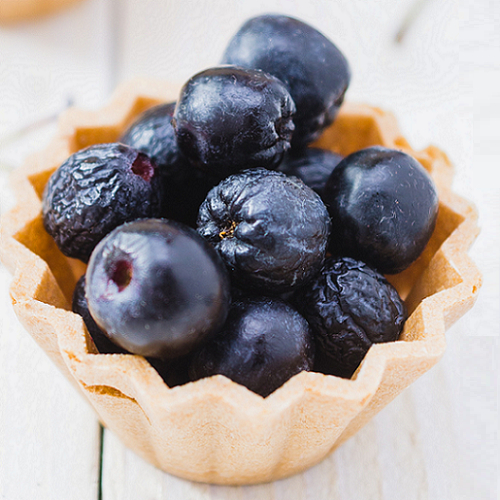Monographs licensed from Therapeutic Research Center, LLC
Scientific names: Aronia arbutifolia, Aronia melanocarpa, Aronia nigra, Aronia prunifolia
Alternate names: Aronia Berry, Black Apple Berry, Black Chokeberry, Purple Chokeberry, Red Chokeberry, Wild Chokeberry
Actions: General, Antibacterial, Anticancer, Antidiabetic, Anti-inflammatory, Antioxidant, Antiviral, Cardioprotective, Dermatologic, Gastrointestinal, Hepatoprotective, Hypolipidemic, Hypotensive, Immune, Neuroprotective
Scientific names: Aronia arbutifolia, Aronia melanocarpa, Aronia nigra, Aronia prunifolia
Alternate names: Aronia Berry, Black Apple Berry, Black Chokeberry, Purple Chokeberry, Red Chokeberry, Wild Chokeberry
Actions: General, Antibacterial, Anticancer, Antidiabetic, Anti-inflammatory, Antioxidant, Antiviral, Cardioprotective, Dermatologic, Gastrointestinal, Hepatoprotective, Hypolipidemic, Hypotensive, Immune, Neuroprotective
Chokeberry is a fruit that comes from the aronia shrub. It's eaten as food in Russia and parts of Eastern Europe. It's also used in traditional medicines.
Chokeberry is high in antioxidants, fiber, and other chemicals. These chemicals might help protect the heart and blood vessels and reduce swelling and blood sugar levels.
People use chokeberry for heart disease, athletic performance, cancer, diabetes, high cholesterol, high blood pressure, and many other conditions, but there's no good scientific evidence to support these uses.
When taken by mouth Chokeberry extract and chokeberry juice are possibly safe for most adults when used short-term. It's usually well-tolerated. Side effects might include constipation, diarrhea, or nausea.
Special Precautions & Warnings:
Pregnancy and breast-feeding: There isn't enough reliable information to know if chokeberry is safe to use when pregnant or breast-feeding. Stay on the safe side and avoid use.
NatMed Pro rates effectiveness based on scientific evidence according to the following scale: Effective, Likely Effective, Possibly Effective, Possibly Ineffective, Likely Ineffective, Ineffective, and Insufficient Evidence to Rate.
- Heart disease. Taking chokeberry by mouth doesn't lower blood pressure, cholesterol levels, or blood sugar levels in people with or at risk for heart disease.
There is interest in using chokeberry for a number of other purposes, but there isn't enough reliable information to say whether it might be helpful.
Chokeberry juice has most often been consumed by adults at amounts of 200-500 mL daily for up to 12 weeks. Speak with a healthcare provider to find out what type of product and dose might be best for a specific condition.
Interactions with pharmaceuticals
Medications changed by the liver (Cytochrome P450 3A4 (CYP3A4) substrates)
Interaction Rating=Moderate Be cautious with this combination.
Some medications are changed and broken down by the liver. Chokeberry might change how quickly the liver breaks down these medications. This could change the effects and side effects of these medications.
Medications for diabetes (Antidiabetes drugs)
Interaction Rating=Moderate Be cautious with this combination.
Chokeberry might lower blood sugar levels. Taking chokeberry along with diabetes medications might cause blood sugar to drop too low. Monitor your blood sugar closely.
Medications that slow blood clotting (Anticoagulant / Antiplatelet drugs)
Interaction Rating=Moderate Be cautious with this combination.
Chokeberry might slow blood clotting. Taking chokeberry along with medications that also slow blood clotting might increase the risk of bruising and bleeding.
Trabectedin (Yondelis)
Interaction Rating=Moderate Be cautious with this combination.
Trabectedin is changed and broken down by the liver. Chokeberry might decrease how quickly the liver breaks down trabectedin. Taking chokeberry along with trabectedin might increase the effects and side effects of trabectedin.
Interactions with herbs & supplements
Herbs and supplements that might slow blood clotting: Chokeberry might slow blood clotting and increase the risk of bleeding. Taking it with other supplements with similar effects might increase the risk of bleeding in some people. Examples of supplements with this effect include garlic, ginger, ginkgo, nattokinase, and Panax ginseng.
There are no known interactions with foods.
vital.ly has licensed monographs from TRC Healthcare.
This monograph was last reviewed on 01/05/2024 10:00:00 and last updated on 19/08/2020 01:50:59. Monographs are reviewed and/or updated multiple times per month and at least once per year.
Natural Medicines disclaims any responsibility related to medical consequences of using any medical product. Effort is made to ensure that the information contained in this monograph is accurate at the time it was published. Consumers and medical professionals who consult this monograph are cautioned that any medical or product related decision is the sole responsibility of the consumer and/or the health care professional. A legal License Agreement sets limitations on downloading, storing, or printing content from this Database. No reproduction of this monograph or any content from this Database is permitted without written permission from the publisher. It is unlawful to download, store, or distribute content from this site.
Natural Medicines rates safety based on scientific evidence according to the following scale: Likely Safe, Possibly Safe, Possibly Unsafe, Likely Unsafe, Unsafe, and Insufficient Evidence to Rate. For more information about Natural Medicines’ Safety Rating System,
click here.
The Natural Medicines Effectiveness Ratings are assigned for specific indications. A product might be rated "Possibly Effective" for one condition, but be rated "Likely Ineffective" for another condition, depending on the evidence. For more info
click here.





